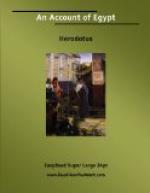to which lake it is a voyage of seven days up the
river from the sea: and I thought that they said
well about the land; for it is manifest in truth even
to a person who has not heard it beforehand but has
only seen, at least if he have understanding, that
the Egypt to which the Hellenes come in ships is a
land which has been won by the Egyptians as an addition,
and that it is a gift of the river: moreover
the regions which lie above this lake also for a distance
of three days’ sail, about which they did not
go on to say anything of this kind, are nevertheless
another instance of the same thing: for the nature
of the land of Egypt is as follows:—First
when you are still approaching it in a ship and are
distant a day’s run from the land, if you let
down a sounding-line you will bring up mud and you
will find yourself in eleven fathoms. This then
so far shows that there is a silting forward of the
land. Then secondly, as to Egypt itself, the
extent of it along the sea is sixty schoines,
according to our definition of Egypt as extending
from the Gulf of Plinthine to the Serbonian lake,
along which stretches Mount Casion; from this lake
then the sixty schoines are reckoned:
for those of men who are poor in land have their country
measured by fathoms, those who are less poor by furlongs,
those who have much land by parasangs, and those who
have land in very great abundance by schoines:
now the parasang is equal to thirty furlongs, and
each schoine, which is an Egyptian measure,
is equal to sixty furlongs. So there would be
an extent of three thousand six hundred furlongs for
the coast-land of Egypt. From thence and as far
as Heliopolis inland Egypt is broad, and the land is
all flat and without springs of water and formed of
mud: and the road as one goes inland from the
sea to Heliopolis is about the same in length as that
which leads from the altar of the twelve gods at Athens
to Pisa and the temple of Olympian Zeus: reckoning
up you would find the difference very small by which
these roads fail of being equal in length, not more
indeed than fifteen furlongs; for the road from Athens
to Pisa wants fifteen furlongs of being fifteen hundred,
while the road to Heliopolis from the sea reaches
that number completely. From Heliopolis however,
as you go up, Egypt is narrow; for on the one side
a mountain-range belonging to Arabia stretches along
by the side of it, going in a direction from the North
towards the midday and the South Wind, tending upwards
without a break to that which is called the Erythraian
Sea, in which range are the stone-quarries which were
used in cutting stone for the pyramids at Memphis.
On this side then the mountain ends where I have said,
and then takes a turn back; and where it is widest,
as I was informed, it is a journey of two months across
from East to West; and the borders of it which turn
towards the East are said to produce frankincense.
Such then is the nature of this mountain-range; and




